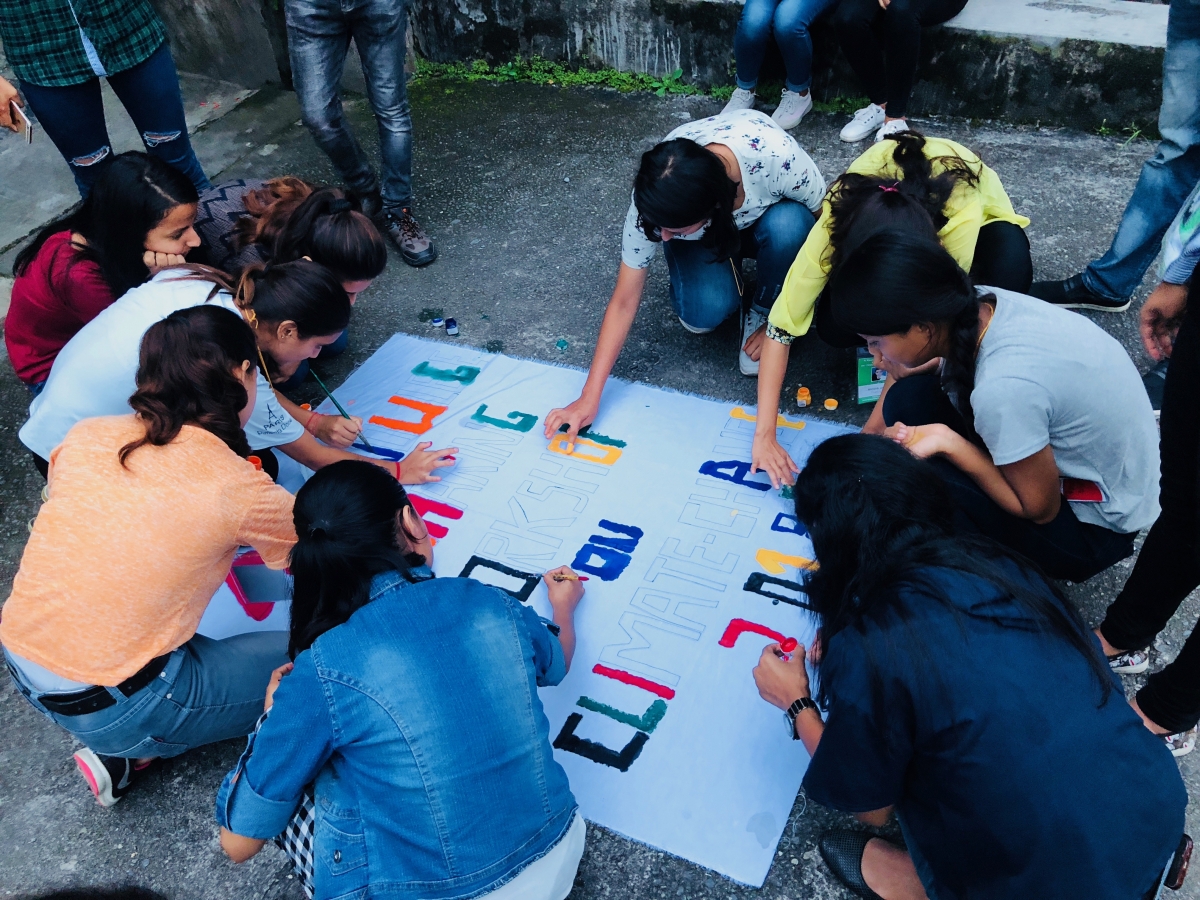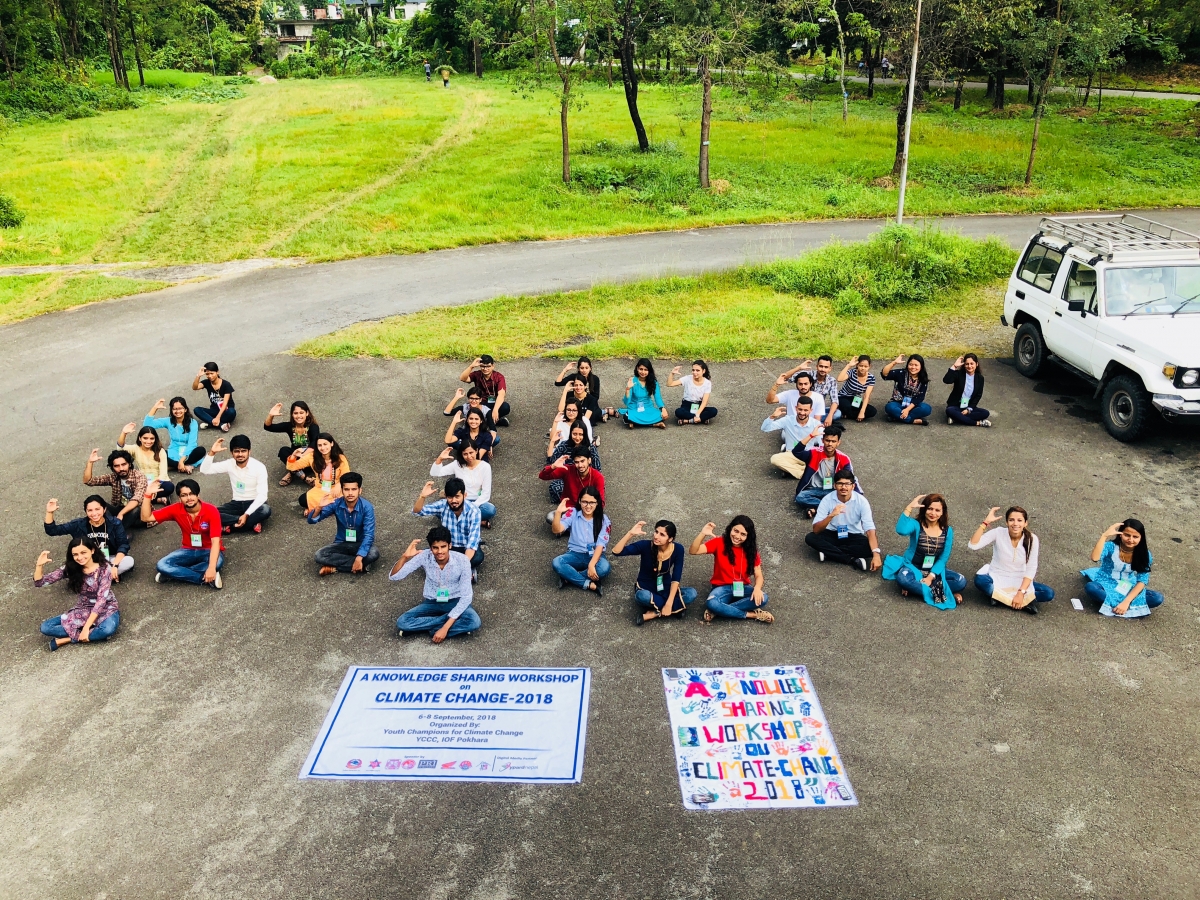-
About
- Our Work
- Get Involved
- Stay Updated
A knowledge sharing workshop on climate change
Starting our journey from Lamjung Climate Convergence (LCC) and Nepal Climate Convergence (NCC), the Youth Champions for Climate Change (YCCC), Institute of Forestry, Pokhara group have done various ground action campaigning like poster competition, Plantation and awareness program about climate change in different schools and children homes.
Recently, we organized a 3-days long workshop on climate change on September 6 - 8 at IOF, with thirty participants from the colleges of Forestry and Agriculture.
We planned to organize a workshop on climate change to sensitize our local leaders with the theme Rise for Climate to make city fossils fuel free and 100% renewable energy based and to create a platform for knowledge sharing on climate change for participants.
 We formally started our workshop by inviting the Mayor of Pokhara Lekhnath Metropolitan Municipality for our opening ceremony, and requesting him to sign on our workshops banner which contains:
We formally started our workshop by inviting the Mayor of Pokhara Lekhnath Metropolitan Municipality for our opening ceremony, and requesting him to sign on our workshops banner which contains: Vision: To make Pokhara fossils fuel free and 100% renewable energy-based city.
Mission:
- To make the youth, students and local leaders aware about climate change, fossil fuel and renewable energy.
- To engage Climate activists for Climate justice.
So, starting our workshop from the basics of climate change in the Nepal context, facilitated by Mr. Saroj Panthi to experience sharing regarding climate change related actions adopted by Annapurna Conservation Area Project (ACAP), facilitated by Mr. Santosh Sherchan, Conservation Officer, ACAP in the first day of the workshop.
We had important sessions of Mr. Ugan Manandhar from World Wildlife Fund (WWF), Myanmar on topic entitled National and International laws and policies regarding Climate Change; Adaptation and Resilience and REDD, facilitated by Mr. Bal Krishna Jamarkattel; on climate change related initiatives in Nepal, facilitated by Mr. Hari Krishna Bhattrai; Forest management and carbon relation, facilitated by Mr. Bikash Adhikari, Asst. Professor, IOF, Pokhara; Plans and policies regarding climate change adopted by Pokhara Lekhnath Metroplitan Municipality facilitated by Mr. Nirmal Bhandari.
The next day, Mr. Abhishek Khadka gave a presentation on Concept of Biodegradable/ Edible plastics followed by Mr. Prasuj Mainali who gave a presentation on Youth involvement in solid wastes management. In the same day, Mr. Dev Raj Gautam facilitated Ground action campaigning and took a session on Sustainable city concept.
Along with these sessions we had field visit to dumping site of Pokhara, where we got exposure about solid waste management system practiced by them and the problems and constraints faced by them and possible ways of proper solid waste management. This field visit was refreshing and will full of knowledge for us.
In the last day, we had our closing ceremony by submitting our above-mentioned vision and mission signed by Mayor Man Bdr. GC and Campus Chief Thakur Silwal along with all participants and students of IOF, to Ward representative to pay attention towards these risky and critical climate change impacts.
 At last, to reduce plastics and non-biodegradable wastes, we promote minimum consumption of non-biodegradable things during our workshop. The best part of our workshop was TOKEN OF LOVE made by reuse of old newspaper by the organizing team themselves. Doing climate change related workshop, we promoted the use of certificates made up of Nepalese paper and banner made up of degradable cloth. We had reused, reduced and recycled every material used or needed for our workshop in the best possible ways.
At last, to reduce plastics and non-biodegradable wastes, we promote minimum consumption of non-biodegradable things during our workshop. The best part of our workshop was TOKEN OF LOVE made by reuse of old newspaper by the organizing team themselves. Doing climate change related workshop, we promoted the use of certificates made up of Nepalese paper and banner made up of degradable cloth. We had reused, reduced and recycled every material used or needed for our workshop in the best possible ways.Hence, our workshop was very much appreciated and loved by everyone around us. It was possible only with the help and support of our helping and supporting hands. We are heartily thankful to Mr. Abhishek Khadka, Mrs. Pabitra Jha, Mr. Prasuj Mainali, Mr. Bikash Adhikari, Mr. Dev Raj Gautam and Mr. Ram Thapa for their support and guidance. It is just our initiation and I am sure we are going to do more in the field of climate change.
Together we can fight against climate change!
Picture credits: YPARD Nepal
About the author
Related Posts
Comments
No comments made yet. Be the first to submit a commentBy accepting you will be accessing a service provided by a third-party external to https://archive.ypard.net/
Get in touch
Email: [email protected]
YPARD Global Coordination UnitHosted by AGRIDEA and the Czech University of Life Sciences Prague
Lausanne, Switzerland and Prague, Czech Republic - Our Work

